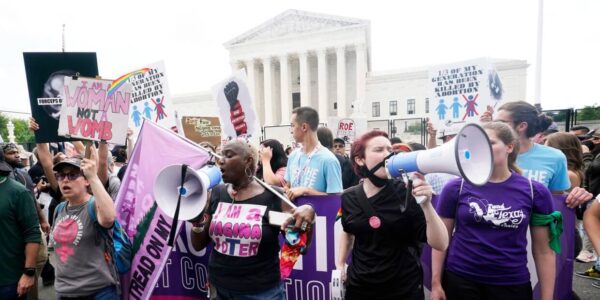In furious dissent, Supreme Court’s liberal wing slams ‘draconian‘ abortion decision

In a scathing dissent to the Supreme Court’s ruling Friday that overturned Roe v. Wade and wiped out the constitutional guarantee of abortion rights, the justices on the bench’s liberal wing slammed the “draconian” opinion as a decision that will undeniably curtail women’s rights and turn back “their status as free and equal citizens.”
The lengthy joint dissent was written by Justices Stephen Breyer, Sonia Sotomayor, and Elena Kagan repeatedly slammed the court’s “cavalier” conservative majority for exercising “hypocrisy” in the way they interpret the Constitution. The justices predicted myriad terrible and possibly deadly consequences for women, particularly low-income women and women of color, in need of abortion care.
Frequently, and with searing verbiage, they concluded that the court’s majority had deemed that women are not deserving of equal protection under the law.
“The majority would allow States to ban abortion from conception onward because it does not think forced childbirth at all implicates a woman’s rights to equality and freedom,” the justices wrote. “Today’s Court, that is, does not think there is anything of constitutional significance attached to a woman’s control of her body and the path of her life.”
“Whatever the exact scope of the coming laws, one result of today’s decision is certain: the curtailment of women’s rights, and of their status as free and equal citizens,” they wrote.
Later in their dissent, the justices were more concise, summing up the majority opinion: “It says that from the very moment of fertilization, a woman has no rights to speak of.”
At another point in their opinion, the justices highlighted what the decision will mean for women who will have to carry pregnancies due to abortion restrictions. “As of today, this Court holds, a State can always force a woman to give birth, prohibiting even the earliest abortions. A State can thus transform what when freely undertaken, is a wonder into what, when forced, maybe a nightmare,” they wrote.
“With sorrow for this Court, but more, for the many millions of American women who have today lost a fundamental constitutional protection — we dissent,” they concluded in the last, blistering line of their dissenting opinion.
Friday’s Supreme Court opinion written by Justice Samuel Alito and backed by Justices Clarence Thomas, Neil Gorsuch, Brett Kavanaugh, and Amy Coney Barrett overturned the landmark Roe v. Wade ruling that guaranteed a constitutional right to an abortion, a momentous break from a half-century of rulings on one of the nation’s most controversial issues. Chief Justice John Roberts voted with the other conservative justices to uphold the Mississippi law at the center of the case but urged in a concurring opinion against going further.
The court’s ruling does not make abortion illegal nationwide, but with access to the procedure no longer deemed a constitutional right, states can now move to ban it. About half the states have already indicated they would move to ban or restrict the procedure.
Nodding to some of those laws, the court’s liberal justices laid out how state legislatures could now effectively force women to endure pregnancies that could kill them or make them carry terminally sick babies to term.
“Enforcement of all these draconian restrictions will also be left largely to the States’ devices,” they wrote.
“They have passed laws without any exceptions for when the woman is the victim of rape or incest. Under those laws, a woman will have to bear her rapist’s child or a young girl her father’s no matter if doing so will destroy her life,” they wrote. “So too, after today’s ruling, some States may compel women to carry to term a fetus with severe physical anomalies for example, one afflicted with Tay-Sachs disease, sure to die within a few years of birth.”
They warned that, without constitutional protection to hold them back, many states will surely go further and could eventually target women receiving care, not just the doctors providing it, in legislation.
“A State can of course impose criminal penalties on abortion providers, including lengthy prison sentences. But some States will not stop there. Perhaps, in the wake of today’s decision, state law will criminalize the woman’s conduct too, incarcerating or fining her for daring to seek or obtain an abortion,” they wrote.
The justices also lamented how the ruling will more dramatically affect low-income women, who may not be able to afford to travel for necessary out-of-state abortion care.
“Today’s decision, the majority says, permits ‘each State’ to address abortion as it pleases,” they wrote. “That is cold comfort, of course, for the poor woman who cannot get the money to fly to a distant State for a procedure.”
They also warned that some legislatures could move to block women from traveling out of state to receive an abortion or abortion medication.
“Those without money or childcare or the ability to take time off from work will not be so fortunate. Maybe they will try an unsafe method of abortion, and come to physical harm, or even die. Maybe they will undergo pregnancy and have a child, but at significant personal or familial cost,” they wrote. “At the least, they will incur the cost of losing control of their lives. The Constitution will, today’s majority holds, provide no shield, despite its guarantees of liberty and equality for all.”
In another section of their dissent, the court’s liberal wing took aim at what they called the majority’s “cavalier approach to overturn” precedents explaining that they have only selectively overturned past rulings on issues that appeal to political and social conservatives.
“Either the mass of the majority’s opinion is hypocrisy, or additional constitutional rights are under threat. It is one or the other,” they wrote.
And in a final pointed stab, the dissenting justices wrapped their opinion with a seeming personal criticism of the court’s majority, comparing the justices unflatteringly to some of their conservative predecessors and suggesting that the court has become irreversibly political.
“The American public, [past conservative justices] thought, should never conclude that its constitutional protections hung by a thread that a new majority, adhering to a new ‘doctrinal school,’ could ‘by dint of numbers’ alone expunge their rights,” they continued.









 For all latest news, follow The Velkinews Google News channel.
For all latest news, follow The Velkinews Google News channel.